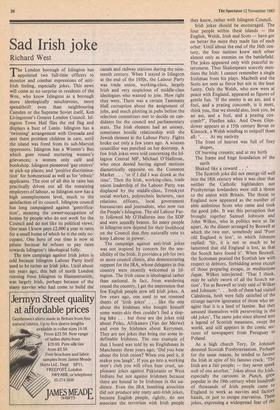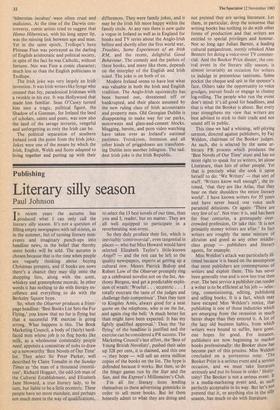Sad Irish joke
Richard West
The London borough of Islington has appointed two full-time officers to monitor and combat expressions of anti- Irish feeling, especially jokes. This news will come as no surprise to residents of the Wen, who know Islington as a borough more ideologically mischievous, more spendthrift even than neighbouring Camden or the Supreme Soviet itself, Ken Livingstone's Greater London Council. Isl- ington Town Hall flies the red flag and displays a bust of Lenin. Islington has a 'twinning' arrangement with Grenada and sent there problem children in care, until the island was freed from its sub-Marxist oppressors. Islington has a Women's Bus which goes round nurturing women's grievances; a women only café and bookshop. Islington pioneered `gay centres' or pick-up places; and 'positive discrimina- tion' for homosexual as well as for 'ethnic' applicants. The cost of all this in rates has practically driven out all the remaining employers of labour, so Islington now has a high unemployment level, much to the satisfaction of its council. Islington council has long campaigned against `gentrifica- tion', meaning the owner-occupation of homes by people who do not work for the Council and do not like its political views. One man I know pays £2,000 a year in rates for a small home of which he is the only oc- cupant. One hero of our time is now in prison because he refuses to pay rates towards Islington's ideological folly.
The new campaign against Irish jokes is odd because Islington Labour Party itself used to be rather an Irish joke. Until about ten years ago, this belt of north London running from Islington to Hammersmith, was largely Irish, perhaps because of the many navvies who had come to build the canals and railway stations during the nine- teenth century. When I stayed in Islington at the end of the 1950s, the Labour Party was trade union, working-class, largely Irish and very suspicious of middle-class ideologues who wanted to join. How right they were. There was a certain Tammany Hall corruption about the assignment of jobs, and much plotting in pubs before the selection committees met to decide on can- didates for the council and parliamentary seats. The Irish element had an uneasy, sometimes hostile relationship with the Jewish element in the Labour Party. Fights broke out only a few years ago. A woman councillor was punched on her doorstep. A few Irish jokes were told concerning the Isl- ington Central MP, Michael O'Halloran, who once denied having signed motions diametrically opposite on the Common Market . . . 'or if I did I was drunk at the time'. Then the Irish, working-class, trade union leadership of the Labour Party was displaced by the middle-class, Trotskyist social workers, polytechnic lecturers, race relations officers, local government bureaucrats and journalists, who now run the People's Islington. The old Labour Par- ty followed Mr O'Halloran into the SDP and were soundly beaten. So many people in Islington now depend for their livelihood on the Council that they naturally vote to keep Labour in power.
The campaign against anti-Irish jokes was not inspired by concern for the sen- sibility of the Irish. It provides a job for two or more council clients, also demonstrating support for the IRA, whose delegates in this country were recently welcomed in Isl- ington. The Irish cause is ideological rather than national. In fact, from wandering round the country, I get the impression that few English people now tell Irish jokes. A few years ago, one used to see roneoed sheets of 'Irish jokes' . . . like the one about the Irishman who bought himself some water-skis then couldn't find a slop- ing lake . . . but these are the jokes told about Poles, Afrikaners (Van der Merwe) and even by Irishmen about Kerrymen. They are not jokes that bring out some in- definable Irishness. The one example of that I heard was told by an Englishman in Manchester three years ago; 'Did you hear about the Irish onion? When you peel it, it makes you laugh'. If you go into a working men's club you will often hear cruel, un- pleasant jokes against Pakistanis or West Indians but not against Irishmen because there are bound to be Irishmen in the au- dience. Even the IRA bombing atrocities did not produce any nasty anti-Irish jokes, because English people, rightly, do not associate the terrorism with Irish people
they know, rather with Islington Council.
Irish jokes should be encouraged. The four people within these islands — the English, Welsh, Irish and Scots — have got on better the more they made fun of each other. Until about the end of the 16th cen- tury, the four nations knew each other almost only as enemies on the battlefield. The jokes appeared only with peaceful in- tercourse. Thus Shakespeare scarcely men- tions the Irish: I cannot remember a single Irishman from his plays. Macbeth and the Scots are seen as fierce but not in the least funny. Only the Welsh, who now were at peace with England, appeared as figures of gentle fun. 'If the enemy is an ass, and a fool, and a prating coxcomb, is it meet, think you, that we should also, look you, be an ass, and a fool, and a prating cox- comb?', Fluellen asks. And Owen Glen- dower appears as a 15th century Bevan or Kinnock, a Welsh windbag to outpuff them all: . At my nativity The front of heaven was full of firey shapes, Of burning cressets; and at my birth The frame and huge foundation of the earth Shaked like a coward . .
The Scottish joke did not emerge till well into the 18th century when it was clear that neither the Catholic highlanders nor Presbyterian lowlanders were still a threat to the union with Britain. The threat to England now appeared as the number of able ambitious Scots who came and took the good jobs. It was this perception that brought together Samuel Johnson and John Wilkes, who in politics were so far apart. At the dinner arranged by Boswell at which the two met, somebody said 'Poor old England is lost', to which Johnson replied: 'Sir, it is not so much to be lamented that old England is lost, as that the Scotch have found it'. When Boswell, the Scotsman praised the Scottish law with respect to debtors, forbidding arrest except of those preparing escape, in meditatione fugae. Wilkes interjected: 'That I think, may be safely sworn of all the Scotch na- tion'. Yet as Boswell so truly said of Wilkes and Johnson: '. . . both of them had visited Caledonia, both were fully satisfied of the strange narrow ignorance of those who im- agine that it is a land of famine. But they amused themselves with persevering in the old jokes'. The same joke since altered into a legend of Scottish meanness, swept the world, and still appears in the comic sec- tions of newspapers from Paraguay 10 Poland.
As a high church Tory, Dr Johnson detested Scottish Presbyterianism. PerhaPs for the same reason, he tended to favour the Irish in spite of his famous crack: 'The Irish are a fair people; — they never speak well of one another.' Jokes about the Irish, especially the cartoons in Punch, greW popular in the 19th century when hundreds of thousands of Irish people came to England to work as navvies and factory hands, or just to escape starvation. These jokes, expressing a widespread fear of the
'hibernian incubus' were often cruel and malicious. At the time of the Darwin con- troversy, comic artists tried to suggest that Homo Hibernicus, with his long upper lip, was the missing link between ape and man. Yet in the same epoch, Trollope's hero Phineas Finn was portrayed as the darling of English aristocratic and political society, in spite of the fact he was Catholic, without fortune. Nor was Finn a comic character; much less so than the English politicians in Trollope.
The Irish joke was very largely an Irish invention. It was Irish writers like Synge who created that fey, paradoxical Irishman with a twinkle in his eye. It was Hollywood that made him familiar. Sean O'Casey turned him into a tragic, political figure, the Shadow of a Gunman, for Ireland the land of scholars, saints and poets, was now also the land of the savage terrorist, vengeful and unforgetting as only the Irish can be.
The political separation of southern Ireland took the point from the Irish joke. Jokes were one of the means by which the Irish, English, Welsh and Scots adapted to living together and putting up with their differences. They were family jokes, and it may be the Irish felt more happy within the family circle. At any rate there is now quite a vogue in Ireland as well as in England for books and TV series about the Anglo-Irish before and shortly after the first world war, Troubles, Some Experiences of an Irish RM, and the recent, delightful Good Behaviour. The comedy and the pathos of these books, and many like them, depends on the interplay of the English and Irish mind. The joke is on both of us.
Modern Ireland seems to have lost what was valuable in both the Irish and English tradition. The Anglo-Irish squirearchy has been burned out, threatened off or bankrupted, and their places assumed by the new ruling class of Irish accountants and property men. Old Georgian Dublin is disappearing to make way for car parks, motorways and glass-and-cement blocks. Mugging, heroin, and porn video watching have taken over as Ireland's national pastimes. Trotskyism, feminism and all other kinds of priggishness are transform- ing Dublin into another Islington. The sad- dest Irish joke is the Irish Republic.















































 Previous page
Previous page